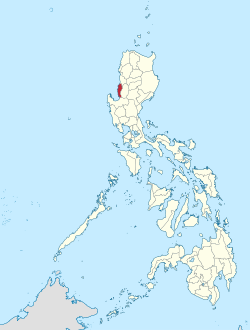La Union
Penampilan
La Union | |
|---|---|
 | |
 Peta Daerah Ilocos dengan La Union dipaparkan | |
 | |
Lokasi di Filipina | |
| Koordinat: 16°30′N 120°25′E / 16.5°N 120.42°EKoordinat: 16°30′N 120°25′E / 16.5°N 120.42°E | |
| Negara | Filipina |
| Daerah | Daerah Ilocos (Daerah I) |
| Barangay | 576 |
| Tarikh asas | 1850 |
| Pentadbiran | |
| • Ketua | Raphaelle Veronica Ortega-David |
| • Pengundi | 510,709 (9 Mei 2019) |
| Keluasan | |
| • Jumlah | 1,497.70 km2 (578.27 batu persegi) |
| Penduduk (1 Mei 2020) [2] | |
| • Jumlah | 822,352 |
| • Kepadatan | 550/km2 (1,400/batu persegi) |
| • Bilangan rumah | 174,096 |
| Ekonomi | |
| • Kelas pendapatan | pendapatan kelas pertama wilayah |
| • Kadar kemiskinan | 6.60% (2021)[3] |
| • Hasil | ₱2,115,259,411.20 (2020) |
| • Aset | ₱8,603,853,602.79 (2020) |
| • Liabiliti | ₱1,360,068,723.32 (2020) |
| • Perbelanjaan | ₱1,669,294,576.18 (2020) |
| Zon waktu | UTC+8 (Waktu Piawai Filipina) |
| Poskod | 2500–2520 |
| PSGC | 013300000 |
| Kod kawasan | +63 (0)72 |
| Jenis iklim | Iklim monsun tropika |
| Bahasa peribumi | bahasa Iloku Kankanaey |
| Laman sesawang | www |
La Union merupakan sebuah wilayah yang terletak di Filipina. Wilayah ini mempunyai jumlah penduduk seramai 822,352. Ibu kotanya ialah San Fernando. Ia mempunyai luas 1,497.70 kilometer persegi. Ia diberikan dengan kod kawasan telefon +63 (0)72.
Ia terdiri daripada bandar dan perbandaran:
- San Fernando
- Agoo
- Aringay
- Bacnotan
- Bagulin
- Balaoan
- Bangar
- Bauang
- Burgos
- Caba
- Luna
- Naguilian
- Pugo
- Rosario
- San Gabriel
- San Juan
- Santo Tomas
- Santol
- Sudipen
- Tubao
Demografi
[sunting | sunting sumber]| Tahun | Pend. | ±% setiap tahun |
|---|---|---|
| 1903 | 137,847 | — |
| 1918 | 178,400 | +1.73% |
| 1939 | 207,701 | +0.73% |
| 1948 | 237,340 | +1.49% |
| 1960 | 293,330 | +1.78% |
| 1970 | 373,682 | +2.45% |
| 1975 | 414,635 | +2.11% |
| 1980 | 452,578 | +1.77% |
| 1990 | 548,742 | +1.95% |
| 1995 | 597,442 | +1.61% |
| 2000 | 657,945 | +2.09% |
| 2007 | 720,972 | +1.27% |
| 2010 | 741,906 | +1.05% |
| 2015 | 786,653 | +1.12% |
| 2020 | 822,352 | +0.88% |
| Ref: Lembaga Perangkaan Filipina [4] [5] [6] | ||
Ekonomi
[sunting | sunting sumber]| Kadar kemiskinan | |
| Ref: Lembaga Perangkaan Filipina[7][8][9][10][11][12][13][14][15] | |
Rujukan
[sunting | sunting sumber]- ^ "Province: La Union". PSGC Interactive. Bandar Quezon, Filipina: Lembaga Perangkaan Filipina. Dicapai pada 12 November 2016.
- ^ Census of Population (2020). "Region I (Ilocos Region)". Total Population by Province, City, Municipality and Barangay. PSA. Dicapai pada 8 Julai 2021.
- ^ "2021 Full Year Official Poverty Statistics of the Philippines" (PDF). 15 Ogos 2022. Dicapai pada 28 April 2024.
- ^ Census of Population (2015). "Region I (Ilocos Region)". Total Population by Province, City, Municipality and Barangay. PSA. Dicapai pada 20 Jun 2016.
- ^ Census of Population and Housing (2010). "Region I (Ilocos Region)". Total Population by Province, City, Municipality and Barangay. NSO. Dicapai pada 29 Jun 2016.
- ^ Censuses of Population (1903–2007). "Region I (Ilocos Region)". Table 1. Population Enumerated in Various Censuses by Province/Highly Urbanized City: 1903 to 2007. NSO.
- ^ "Kadar kemiskinan:". Lembaga Perangkaan Filipina. Dicapai pada 28 Disember 2020.
- ^ "Estimation of Local Poverty in the Philippines" (PDF). 29 November 2005.
- ^ "2009 Official Poverty Statistics of the Philippines" (PDF). 8 Februari 2011.
- ^ "Annual Per Capita Poverty Threshold, Poverty Incidence and Magnitude of Poor Population, by Region and Province: 1991, 2006, 2009, 2012 and 2015". 27 Ogos 2016.
- ^ "Annual Per Capita Poverty Threshold, Poverty Incidence and Magnitude of Poor Population, by Region and Province: 1991, 2006, 2009, 2012 and 2015". 27 Ogos 2016.
- ^ "Annual Per Capita Poverty Threshold, Poverty Incidence and Magnitude of Poor Population, by Region and Province: 1991, 2006, 2009, 2012 and 2015". 27 Ogos 2016.
- ^ "Annual Per Capita Poverty Threshold, Poverty Incidence and Magnitude of Poor Population, by Region and Province: 1991, 2006, 2009, 2012 and 2015". 27 Ogos 2016.
- ^ "Updated Annual Per Capita Poverty Threshold, Poverty Incidence and Magnitude of Poor Population with Measures of Precision, by Region and Province: 2015 and 2018". 4 Jun 2020.
- ^ "2021 Full Year Official Poverty Statistics of the Philippines" (PDF). 15 Ogos 2022. Dicapai pada 28 April 2024.
Pautan luar
[sunting | sunting sumber]- PhilAtlas.com
- Philippine Standard Geographic Code
- Philippine Census Information
- Local Governance Performance Management System
- www
.launion .gov .ph



